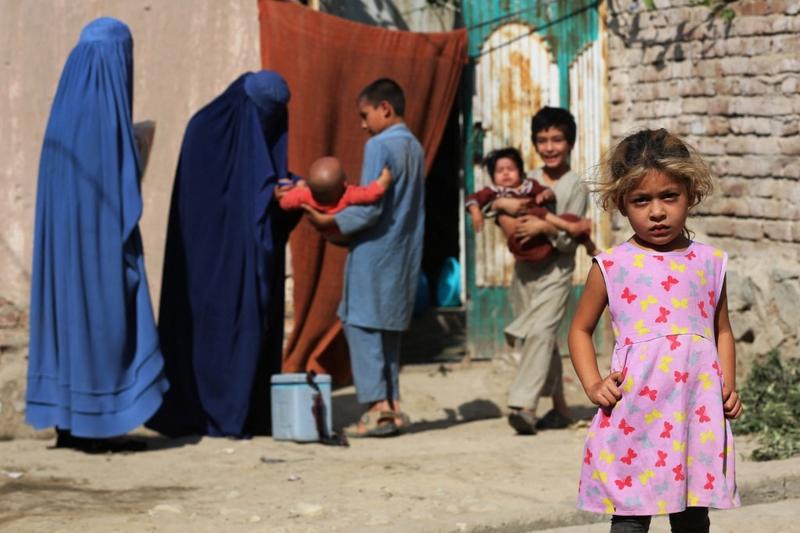 A girl watches as Afghan burqa-clad health workers administer polio vaccine drops to a child during a vaccination campaign in Bihsud district of Nangarhar province on October 17, 2022. (PHOTO / AFP)
A girl watches as Afghan burqa-clad health workers administer polio vaccine drops to a child during a vaccination campaign in Bihsud district of Nangarhar province on October 17, 2022. (PHOTO / AFP)
GENEVA / NEW YORK - The United Nations and partners on Thursday appealed for a record $51.5 billion in aid money for 2023, with tens of millions of additional people expected to need assistance, testing the humanitarian response system "to its limits".
The appeal represents a 25 percent increase on 2022.
The UN Global Humanitarian Overview estimates that an extra 65 million people will need help next year, bringing the total to 339 million in 68 countries.
The UN Global Humanitarian Overview estimates that an extra 65 million people will need help next year, bringing the total to 339 million in 68 countries
That represents more than 4 percent of the people on the planet or about the population of the United States.
"Humanitarian needs are shockingly high, as this year's extreme events are spilling into 2023," said UN Emergency Relief Coordinator Martin Griffiths, citing the conflict in Ukraine and drought in the Horn of Africa.
"For people on the brink, this appeal is a lifeline."
READ MORE: Aid agencies call for urgent relief against famine in Horn of Africa
Over 100 million people have been driven from their homes as conflict and climate change fuel a displacement crisis.
Nine months of conflict in Ukraine have disrupted food exports and around 45 million people in 37 countries are currently facing starvation, according to the report.
The COVID-19 pandemic has led to major setbacks in child vaccination programs and thwarted efforts to end extreme poverty, fuelling other diseases such as cholera, Griffiths said at the launch on Thursday.
For the first time ever, ten countries have individual appeals of more than $1 billion - Afghanistan, the Democratic Republic of Congo, Ethiopia, Nigeria, Somalia, Sudan, South Sudan, Syria, Ukraine and Yemen
For the first time ever, ten countries have individual appeals of more than $1 billion - Afghanistan, the Democratic Republic of Congo, Ethiopia, Nigeria, Somalia, Sudan, South Sudan, Syria, Ukraine and Yemen.
But donor funding is already under strain with the multiple crises, forcing aid workers to make tough decisions on priorities.
The United Nations faces the biggest funding gap ever, with its unmet funding at 53 percent in 2022, based on data through to mid-November.
"The humanitarian response system is being tested to its limits," Griffiths said.
Unlike in other parts of the UN where fees depend on countries' economic size, humanitarian funding is voluntary and relies overwhelmingly on Western donations.
Somalia hunger
In Somalia, the Integrated Food Security Phase Classification (IPC) - used by UN agencies and aid groups to determine food insecurity - in September projected a famine in two districts in Somalia. The IPC is expected to issue a new analysis of the situation in the coming weeks.
Griffiths said that he understands that a famine will not yet be declared in Somalia, but he warned: "We can assume that in Somalia and soon in Ethiopia, where the numbers will be much worse ... people are dying already of hunger and starvation."
Famine has been declared twice in the past 11 years: in Somalia in 2011 and in parts of South Sudan in 2017.
"Half the people who died in Somalia died before the famine was declared," International Rescue Committee President David Miliband told the Reuters NEXT event. "Why aren't we taking action now because we know the deaths are starting now."
The most extreme warning by the IPC is phase 5, which starts with a catastrophe warning and rises to a declaration of famine in a region.
Somalia's drought envoy, Abdirahman Abdishakur also told Reuters that the humanitarian community had said the threshold for a famine had not yet been met, but that "they told the government that a famine will be declared, maybe in a few months, if the rains fail again."
ALSO READ: Somalia army, allied militia kill 20 al Shabaab fighters
For famine to be declared, at least 20 percent of the population must be suffering extreme food shortages, with at least 30 percent of children acutely malnourished and two people out of every 10,000 dying daily from starvation or from malnutrition and disease.
"If they have the data and examine it and they decide the threshold has been met then the Somali government is not against famine (declaration). But the threshold must be met and it hasn't," Abdishakur said. "There are no politics in this, it is only data."


